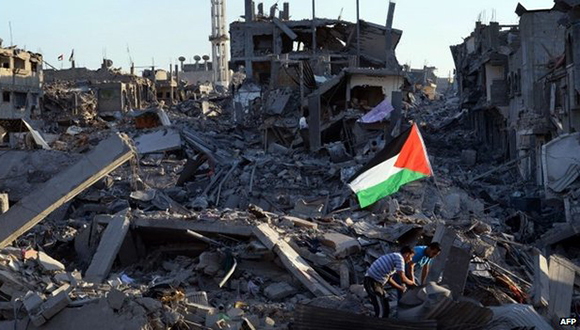by David Finkel
August 13, 2014
Cease-fires–brief interruptions in Israel’s destruction of Gaza–come and go, for one simple reason: Israel will not lift the blockade, the siege, the strangulation of Gaza, and the United States will not force it to do so. Officially, the line is that the blockade won’t end “until the rockets stop and Hamas is disarmed.” The reality is that if Hamas were disarmed and the rockets stopped the blockade would continue anyway, and the people of Gaza know it, because the real Israeli goal is crushing the population and destroying people’s will to resist–first in Gaza, then in the West Bank and throughout Palestine.
If it were possible to expel the Gazans, the current Israeli government would strongly consider that option. Since expulsion is not physically or politically feasible, massive destruction is the alternative. The reality is that brutal and straightforward, and any explanations that make it look “complicated” are fraudulent.
This time around, the world is more aware than ever that United Nations schools, refugee shelters, hospitals, and kids on the street have been deliberately hit. The Israeli regime has made it clear that it doesn’t care who knows. The bill for this massacre will come due, but not anytime soon–not so long as the wretched Obama administration makes daily pronouncements on “Israel’s right to defend itself” and boasts about U.S. partnership in Iron Dome.

As Noam Chomsky rightly observes, what Israel is doing in the Occupied Palestinian Territories is far from South African apartheid: it is much, much worse. Indeed, the apartheid regime at its murderous worst didn’t bomb apartment blocks in Soweto, whose inhabitants the South African economy required as its labor force.
No one honestly looking at the U.S. role in Palestine can entertain any illusions that it has progressive intentions in its new military intervention in Iraq. How does the rhetoric of preventing a slaughter of civilians by the hideous “Islamic State” in northern Iraq mesh with supplying the weaponry for the massacre of civilians in Palestine?
That’s not the only side of the question, however. Socialists who support self-determination for the Palestinian people also support the right of self-determination of the Kurdish people–and certainly, the right of minorities (Yazidis and Christians) not to be massacred. There can be no question that the armed forces of the autonomous Kurdish territory in Iraq are waging a progressive war against the “Islamic State,” and their victory is the only hope for stopping a real genocide against religious minorities in northern Iraq.
For the same reasons that the people of Gaza and the resistance are justified in getting assistance from anywhere they can, the Kurdish forces have the right to demand the assistance they need against an invading enemy heavily armed with the U.S. weapons that were abandoned by the northern Iraqi army as it melted down. The Iraqi catastrophe is a direct product of the U.S. invasion that tore that society apart.
While supporting the Kurdish forces’ right to receive the aid they need, we should have no illusions that Washington’s motivations in Iraq, or anywhere else, are either humanitarian or democratic. It’s our hope that the Kurds will take as much freedom as they can defend – and save the populations facing annihilation by the “Islamic State” – with full knowledge that the imperial benefactors who praise them as brave liberators today may treat them like Palestinians tomorrow.
David Finkel is an editor of Against the Current and member of Solidarity.

Comments
One response to “The Growing Crisis in the Middle East: An Update on Palestine, Iraq, and Kurdistan”
It is clear that we should back the Kurds against ISIS: they are not only resisting sectarian ultra-Islamism but defending their national rights. Christian and Yezidi religious minorities have fled the ISIS advance.
Obama says that the US bombing is aimed at helping those religious minorities. However, we know that the US is highly selective about aiding persecuted minorities. Consider the analysis offered by US academic Juan Cole:
“Likewise, Washington wants the Kurds to remain within a federal Iraqi framework rather than declaring independence, and seems to be bombing ISIS positions for the Kurds in order to extract a promise from Kurdistan president Massoud Barzani that he will stay in Iraq”.
The US is bombing with its own motives, but those motives include aid to the Kurds. The US military action is unlikely to escalate to the point where it becomes the dominant factor and sidelines the Kurds-vs-ISIS issues. However, it does not follow that we should support or endorse the US bombing. Nor should we be campaigning to “stop the bombing”! The bombing cannot be assessed in isolation from overall US policy, which has fueled Sunni ultra-Islamists rather than undercut them. 12 years of US bombing in Afghanistan has left the Taliban stronger, not weaker. When the US had huge occupation forces in Iraq, and extensive military control, it reconquered the city of Fallujah after it had been taken over by Sunni ultra-Islamists, and both times failed to install a local government well-accepted enough to resist new ultra-Islamist takeovers.
I learned a great deal from this article which I think should inform our attitude towards U.S. military activity in Kurdistan. I am however skeptical of its take on the PYD-PKK.
Kurds mobilise to fight ‘Islamic State’ over vast front
at: http://links.org.au/node/4002
“The Kurds have every right to accept aid from whoever will give it. But the US is not the friend of the Kurds. The past is replete with its betrayals of Kurdish national hopes.”